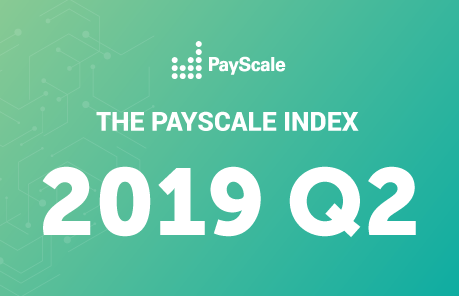Seattle, WA – July 16, 2019 – Today, PayScale Inc, the leader in precise, on-demand cloud compensation data and software for businesses and individuals, released the Q2 2019 PayScale Index, which tracks quarterly and annual trends in compensation and provides a U.S. wage forecast for the coming quarter.
The most recent Q2 Index revealed nominal wages grew 0.3 percent since Q1 and 2.0 percent year over year. However, the modest uptick in nominal wages was insufficient to translate into robust real wage growth. The Index shows real wages fell by 0.8 percent over the last quarter and were only slightly up from where they were a year ago, growing at just 0.2 percent. This means that the average person cannot purchase much more than they could a year ago when wage growth is measured in relation to inflation.
“While there are some encouraging signs with nominal wages growing in select industries and job families, this increase is still not enough to impact real wage growth in a meaningful way,” said Sudarshan Sampath, Director of Research at PayScale. “Our most recent Index shows there are some bright spots in the economy, but many industries – those with a high proportion of blue-collar jobs, in particular – are still struggling.”
Here are key findings from the Q2 2019 PayScale Index:
Marketing and Media jobs showed positive wage growth:
- For the second quarter in a row, Marketing and Advertising jobs showed the most annual wage growth of any industry with a 3.0 percent increase year over year.
- Likewise, Media and Publishing jobs posted strong numbers with annual wage growth of 2.8 percent.
- Retail jobs also posted notable wage growth with wages increasing 2.8 percent annually.
Jobs with fewer highly-skilled workers showed less wage growth:
- Wages for Manufacturing & Production jobs and Transportation jobs were at the bottom of the list with annual wage growth of just 0.9 percent and 0.4 percent, respectively.
- In addition, the Energy & Utilities industry was at the bottom of the industry list, but still had notable growth. While nominal wages were down 0.2 percent over the quarter, they were up 1.1 percent annually.
San Francisco leads the U.S. in wage growth:
- The tech center of San Francisco was again the metro area that experienced the largest increase in annual wage growth of 4.5 percent.
- Milwaukee experienced annual wage growth of 3.5 percent, the second highest in the country.
- Meanwhile, Pittsburgh and Cleveland had less than stellar wage growth with annual wages increasing just 0.8 percent and 0.7 percent, respectively.
Nominal wages in Canada were also up:
- Nationally, wages in Canada grew by 2.0 percent year over year, the same as nominal wage growth experienced in the U.S.
- Montreal topped the Canadian list of metros with increased annual wage growth of 3.3 percent while the energy city of Edmonton saw wages fall 0.5 percent year over year.
The PayScale Index is a different economic measure than the Employment Cost Index (ECI) reported by the Bureau of Labor Statistics (BLS). While the ECI tracks employment costs within organizations, the PayScale Index tracks workers’ wages across various organizations. This means the PayScale Index will capture changes in employees’ wages when they move to a different company, while the ECI does not. There is value in using both the ECI and the PayScale Index to determine relative wage growth in the U.S. economy.
To view the entire interactive Q2 2019 PayScale index which reflects wage trends across various industries, job categories, company sizes and major metros, including Canada, please visit: https://www.payscale.com/payscale-index For information about the methodology of the PayScale Index, please visit: https://www.payscale.com/payscale-index/compensation-trends-methodology
About PayScale:
PayScale offers modern compensation software and the most precise, real-time, data-driven insights for employees and employers alike. More than 8,000 customers, from small businesses to Fortune 500 companies, use PayScale to power pay decisions for more than 23 million employees. These companies include Encana, Patagonia, The New York Times, Sunsweet, T-Mobile, United Health Group, Wendy's and Perry Ellis. For more information, please visit: https://v2-wp-staging.payscale.com/ or follow PayScale on Twitter: https://twitter.com/payscale.
Press Contact:
Phyllis McNeice
Email: phyllis@fireflycmns.com
Tel: 206-954-1481
